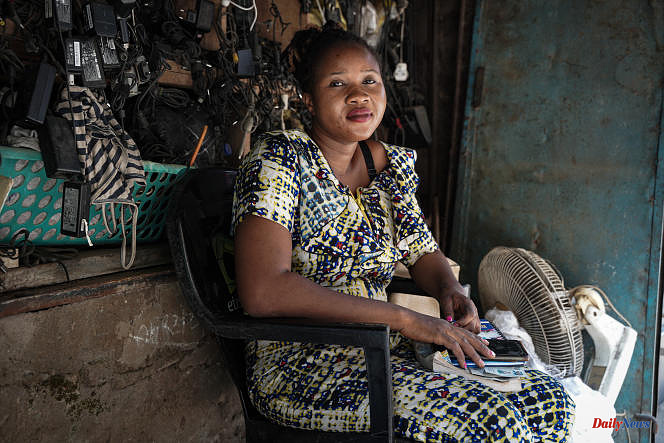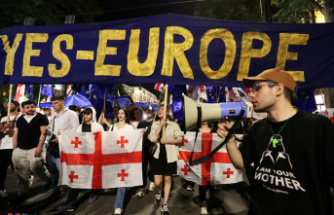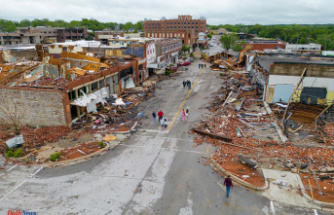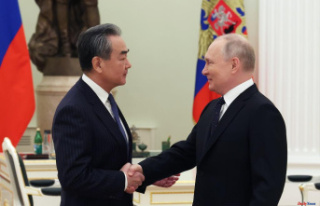"Nigeria does not bring us anything, so it is better that we leave Nigeria! Sitting behind a small desk in the darkness of his workshop, Paul, 46, has no words harsh enough against his country and its leaders. Like many residents of Onitsha, the commercial capital of Anambra State (southeast), the seller of body parts expects nothing from the polls to be held on Saturday February 25 in the most populous country from Africa.
For the first time, an Igbo, like him, is in a good position in the race for the presidency. But Peter Obi, candidate of the Labor Party (LP), may well be the former governor of Anambra State (between 2007 and 2014), he does not rally, far from it, all the votes in this region worked by separatist tendencies.
Until then, Paul had always gone to vote. In 2015 as in 2019, he gave his voice to Muhammadu Buhari, a Hausa from the north, who today completes his second term at the head of the most populous country in Africa. But under his administration, insecurity has gained ground and the economic crisis has deepened further. “They speak of unity but only divide us. Every time we vote for them, but they don't do anything for us", enrages the trader
“Our roads are abandoned, we have no water or electricity. There isn't even a good hospital in all of South East Nigeria! »
By dint of disappointment, this father of six children ended up "changing his mind" and taking an interest in the theories broadcast on Radio Biafra by Nnamdi Kanu, the leader of the Indigenous People of Biafra (IPOB). The movement, founded in 2012, took over from other fading pro-secession groups in the region. But the "peaceful agitation" advocated by the separatist activist has met with resistance from federal authorities, anxious to avoid any reminiscence of the bloody civil war that claimed at least one million lives from 1967 to 1970.
Arrested for the first time in October 2015, Nnamdi Kanu was imprisoned for more than a year, before being released on parole pending trial. In April 2017, he fled after the attack and destruction of his house by the security forces. In the same year, the IPOB was classified as a "terrorist organization" by Nigeria. After a four-year run between Israel and the United Kingdom, the separatist leader was again "intercepted" by the Nigerian services in June 2021.
Charged in particular with terrorism and high treason, he has since been imprisoned in Abuja. In mid-October 2022, an appeals court quashed the charges against him and ruled his arrest and detention unlawful as authorities failed to follow extradition procedures when they captured him in Kenya and brought him back. in Nigeria. His trial has since been adjourned indefinitely.
Security deterioration
The rise of the IPOB went hand in hand, in the south-east of Nigeria, from 2021, with a deterioration of the security situation, in the States of Imo and Anambra.
“Armed groups have killed dozens of security personnel, razed police stations, courts and prisons as well as offices of the electoral commission, lists a recent report by the International Crisis Group (ICG). Government and security officials, as well as some locals, attribute these attacks to the IPOB and its armed wing, the Eastern Security Network [ESN, established in late 2020]. This assertion, although regularly denied by the IPOB, is plausible. »
Some local observers, however, believe that these attacks by "unidentified armed men" are purely criminal acts and that the intractable posture of the authorities in the face of the separatist sling has only heightened tensions in the region.
A few meters from Paul's workshop, on the Mgbuka Obosi car market, Dominique, 35, assembles, for a few euros a day, minibuses imported from Japan in spare parts. He too no longer believes in the unity of Nigeria. “We keep inheriting the suffering from our parents and grandparents since the Civil War,” he says, wiping the sweat from his brow:
“When we protest peacefully, the soldiers shoot us with live ammunition and come looking for us even in our houses. There was never any dialogue with us, nor any rehabilitation. They always preferred to shoot in the crowd, because we come from the east. »
The Igbo have a persistent feeling that a "plot" has been hatched to prevent them from attaining the highest offices of state. "For part of the elite in the north but also in the south-west, they are indeed perceived as a problem," confirms analyst Ikemesit Effiong, who works for the firm SBM Intelligence in Lagos. According to him, this feeling was reinforced by the intractable attitude of President Buhari, for whom the unity of Nigeria is non-negotiable:
“The separatist undercurrent has always existed in Nigerian political discourse. But by allowing the security services to directly combat the agitators and by ignoring court decisions in the Kanu case, Muhammadu Buhari has opened Pandora's box and militarized the Biafran issue. »
Generalized economic crisis
In response, to put pressure on the government and demand the release of its leader, the IPOB stepped up “dead city” operations in southeastern Nigeria. Every Monday since the arrest of Nnamdi Kanu, the huge market of Onitsha is completely deserted. "We take it as a day off but it affects our business, especially as criminals take advantage of it to sow terror in the region," sighs Rita, 39, who sells cables and chargers. In his village, there are countless deaths and disappearances. Although she also believes that the Igbo are politically discriminated against, Rita is well aware that the widespread economic crisis has only heightened separatist sentiment in her region:
“If the naira was at par with the dollar, I can tell you that nobody would complain! People are suffering, that's why they want to have their own country and a new currency. Maybe with Biafra it would be worse… but since Nigeria is not doing anything for us, they want to try something else. »
However, the looming elections have opened up a third way with Peter Obi, who enjoys an excellent reputation in the region. By distancing itself from the People's Democratic Party (PDP, opposition) to impose itself as the third man in the ballot, it has revived hopes that an Igbo can finally become president of Nigeria. “According to PDP regulations, a man from the south of the country should have represented the party for these elections. But once again, Atiku Abubakar, a Hausa from the north, was chosen as the candidate, points out analyst Keke Reginald Chike. This again gave the impression that no one trusts the Igbo when it comes to power. »
On the Onitsha market, the candidacy of Peter Obi divides. There are those who finally feel represented and those who reject this ballot en bloc to demand a referendum on the self-determination of Biafra. For the moment, the IPOB has not given clear indications on a possible operation "dead city" on the day of the vote. "All of this puts them in a difficult situation," notes Ikemesit Effiong. The southeast is traditionally a low-voting region, and fear of violence may deter some residents from leaving their homes.
"If they jeopardize the election of an Igbo president, the separatists could be seen as saboteurs," says the analyst. On the other hand, if Peter Obi is elected, many of the arguments of the separatist movement will be completely undermined. According to him, the election of an Igbo as head of the Nigerian state could even mark "the beginning of the end" of the separatist movement.












